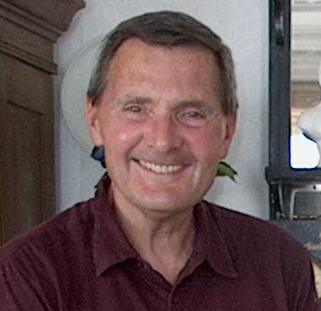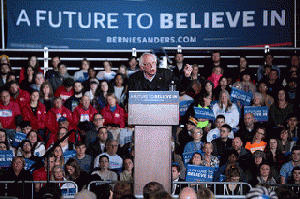As an
avid follower of Bernie Sanders's campaign for President, I'm heartened by recent
polls that show he now commands a broad level of support from the American
electorate that could not have been foreseen by the conventional wisdom of only
a year ago.
Poll results have long suggested that a large majority of Americans--of which I am one--agree with most, if not all, of Bernie's proposed solutions for reducing the country's egregious income inequality and boosting the middle class. This level of popular support for major government reforms in the private economy may also indicate a growing belief that "rugged individualism," a virtue of American pioneers still venerated by the Tea Party, no longer serves as a general model for economic success.
Indeed, given the complexities of the modern economy and its global reach, it is certainly true that few individuals can "make it" in America today by relying exclusively on their own initiative or skills. Yet, in a period when rational government intervention is sorely needed to restore economic opportunity for all Americans, most have been left in the lurch. The economy continues to be rigged by a corrupt Washington political establishment that, in return for now uncapped corporate funding of federal election campaigns, overlooks the broad common interest of the nation and serves instead the narrow special interests of global corporations and their rich and powerful managers. That neglect, according to published reports, has caused many Americans who can't find decent work or are stuck in jobs with long-stagnant wages to lose their faith that, in America, "hard work and playing by the rules" are the keys to success. For these Americans and many others who fear that one day they too will face the same predicament, Bernie Sanders's substantive proposals for helping the middle class and the struggling poor who aspire to it have brought new hope. It is a hope, moreover, that, based on Bernie's own actions as a candidate, can motivate many to direct political action. By declining PAC money, and advancing policy proposals to get all Big Money out of national politics, Bernie has clearly demonstrated his bona fides as a genuine fighter for ordinary people. People can be certain, therefore, that in fighting for Bernie they are also fighting for themselves.
A Campaign Gaining Steam
In line with the overwhelming support for his reform proposals, Bernie's campaign to become President is itself now beginning to gain steam. The latest tracking polls show him drawing even, or pulling narrowly ahead, of Hillary Clinton in the bellwether Iowa and New Hampshire primary contests. He is also closing in on Hillary in terms of national support, and generally matching up more favorably than she is against possible Republican opponents in the November election. All these trends, of course, increase the credibility of Bernie's run for President and the chance that he may in fact gain the Democratic nomination and win the election.
Despite this growing momentum, however, I believe it remains far from certain at this point that Bernie will win it all. One major obstacle is the still transparent support for Hillary by the Democratic party establishment, and its resistance to Bernie's outsider status as a "democratic socialist." Another is the general neglect of Bernie by the mass media up to now, resulting from their own commercial interests, their role as communication conduits for the American power structure, and their uncritical acceptance of orthodox establishment views. A third obstacle for Bernie is the imponderability of selling the American public on fundamental political change that challenges widespread cultural shibboleths, including reverence for the "Free Market," suspicion of "Big Government," and the still common notion that social worth is most reliably reflected by measures of income or wealth.
Given these obstacles, I believe two enhancements of the Sanders campaign may be needed to help give it staying power and strengthen its competitiveness. The first is to couch Bernie's program of economic fairness and social justice for the 99 Percent in the moral context of an American national community. From that perspective, the campaign would be required to not only push its demand that a larger portion of the economic pie be transferred from the Few to the Many, but also recognize with respect the indispensable role of the fortunate Few in generating the wealth by which the necessary reforms to achieve such a transfer can be funded.
The Sanders campaign could also be strengthened by making fully operational a vital component of Bernie's political strategy that he has long called for: the mobilization of millions of Americans in a broad popular movement that seeks in various ways to promote both his election and the adoption of his proposed reforms. According to an email message I received a few days ago from the Sanders campaign, Bernie himself will make a start toward creating such a movement with a live-stream special message to his supporters at 6 p.m. EST on January 23.
Pushing the Concept of an American "Community"
As I see it, Bernie's proposed reforms can gain maximum resonance with more Americans, including struggling conservatives, if they are presented not in the context of condemning the greed of the rich and powerful (though, of course, such condemnation may in many cases be justified), but in a moral appeal to the concept of an American "community." I would urge Bernie to expound on this watchword in his speeches, emphasizing first that, as members of one national community, all Americans have their parts to play. Representing the 99 Percent are the small-business operators, civil servants, health providers, lawyers, educators, journalists, freelancers, and ordinary working people who build and maintain the country's multi-faceted economic infrastructure; included in the One Percent are the corporate managers who make use of that foundation to create enormous economic wealth. This reminder should be followed by the equally important moral point that, as members of a national community, "We're all in this together." We all have an obligation to seek the well-being not only of ourselves, but of other members of the community.
Naturally, in the context of Bernie's economic reform proposals, the major onus for financing programs to enhance the well-being of those in need would fall on the very rich, who, along with the corporate bodies that underwrite their wealth, would be taxed at significantly higher rates. Such a hit could hardly be condemned as unfair, however, when regarded from the perspective of an American national "community." While the higher taxes would leave the very rich still very rich, and scarcely diminish lavish life styles, the revenues derived from them would help lift millions upon millions of working Americans from the want and burdens of financial struggle. Such an exchange, moreover, would reflect no taint of charity. It would be a matter of fairness (another long-held American virtue), since the extreme fortunes of the Few are dependent on the economic foundations created by the daily efforts of the Many.
The concept of American "community" would also underscore the revolutionary character of Bernie's campaign. It would signal that, as President, he would shift the primary focus of his administration away from the interests of corporate managers and billionaires to the well-being of the nation as a whole. In that political model, Americans with great power and wealth would no longer be regarded as privileged members of a small elite class; instead, they would simply be seen as rich members of a heterogeneous American community. As with other Americans, those in the "Billionaire Class" would be expected on moral principle to not only pursue their own self-interest, but to make sacrifices within their means to help ensure the well-being of all members of the national community.
What Bernie's "Political Revolution" Would Mean and How It Can Be Won
The concept of an American community is also totally consistent with a second enhancement of Bernie's campaign that I believe could help ensure its ultimate success. This is the mobilization of a mass political movement that, as I envision it, would be designed to 1) get out the vote for Bernie, 2) help get progressive supporters of his program elected to Congress, and 3) keep pushing his program with the next Congress, regardless of its political composition, if Bernie is elected President. As I've mentioned, the candidate himself will deliver a live-stream special message on this subject to his supporters at 6 p.m. EST on January 23.
There seems to be little question that radical reform of our economy is sorely needed today, when so few people have so much and so many have so little. Current indicators of income inequality are in fact so extreme, so unfair, and so unsustainable that it should drive Americans not only into the streets, but to their telephones, computer keyboards, and activist planning sessions to wage the kind of "political revolution" needed to get Bernie elected and his program adopted into law. As the candidate has often stated, he alone cannot shift the focus of the federal government from the narrow special interests of the rich and powerful to the broad common interest of America's "99 Percent." The present political culture and governing system are so deeply entrenched that only a united mass movement of the people can move uncommitted voters, corporate managers, and members of Congress to begin to associate their own well-being, self-worth, or viability with support for Bernie's reform program. Such a movement would, I believe, prove invincible, since it would be driven by a moral power, unavailable to its opponents, which would by its very nature attract more and more adherents every day.
(Note: You can view every article as one long page if you sign up as an Advocate Member, or higher).






